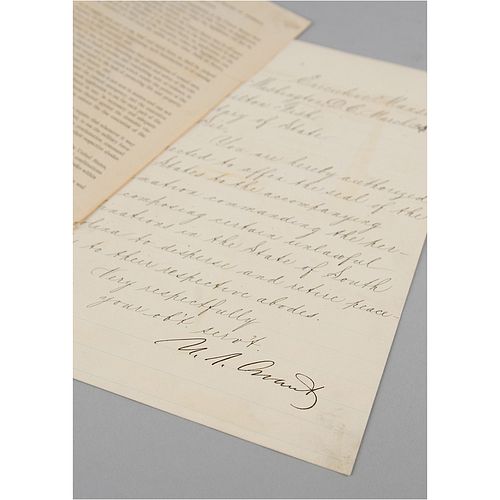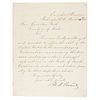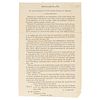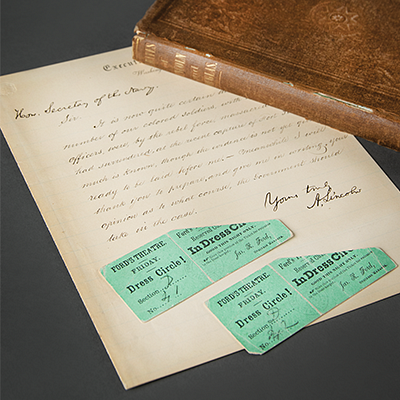U. S. Grant Document Signed as President to End Ku Klux Klan Violence
Two ways to bid:
- Leave a max absentee bid and the platform will bid on your behalf up to your maximum bid during the live auction.
- Bid live during the auction and your bids will be submitted real-time to the auctioneer.
Bid Increments
| Price | Bid Increment |
|---|---|
| $0 | $5 |
| $50 | $10 |
| $200 | $25 |
| $500 | $50 |
About Auction
Sep 23, 2023
RR Auction support@rrauction.com
- Lot Description
Manuscript DS as president, one page, 7.75 x 9.75, March 24, 1871. President Grant directs Secretary of State Hamilton Fish to "affix the seal of the United States to the accompanying Proclamation commanding the persons composing certain unlawful combinations in the State of South Carolina to disperse and retire peaceably to their respective abodes." Neatly and boldly signed at the conclusion by President Ulysses S. Grant. In fine condition, with some light, slightly irregular toning. Accompanied by a modern printing of the text of Grant's proclamation, in which he commands 'armed men, unauthorized by law‰Û_disturbing the peace and safety of the citizens of the State of South Carolina and committing acts of violence'—members of the Ku Klux Klan—to 'disperse and retire peaceably to their respective abodes within twenty days,' under threat of force by the United States military.
The document represents President Grant's early response to Klan violence in the state of South Carolina, which had been increasing since the election of Republican Governor Robert Kingston Scott in 1868. Subsequent federal investigations uncovered evidence of hundreds of whippings and dozens of racially motivated murders in South Carolina between 1870 and 1872. Governor Scott pleaded with President Grant for federal intervention, and in March 1871 the president issued this proclamation commanding all Klansmen to retire peaceably from their reign of terror. He also ordered US Army Major Lewis Merrill, commanding Companies B, E, and K of George A. Custer's Seventh U.S. Cavalry, to the state in an effort to quell the violence and keep the peace.
Though Merrill's initial efforts were successful in uncovering and documenting Klan violence, local juries—oftentimes comprised of accessories to or supporters of such heinous acts—were reluctant to prosecute offenders, and the crime wave continued. Finally convinced that Klan activities in South Carolina amounted to warfare, on October 12th, Grant ordered all persons to 'disband and disperse' from the 'unlawful combinations and conspiracies' commonly known as the Ku Klux Klan, and to hand over their weapons and disguises to federal marshals. After receiving no such compliance, on October 17th, Grant issued another proclamation declaring nine counties in active rebellion and suspended habeas corpus.
The suspension of habeas corpus allowed Major Merrill to make mass arrests of Klansmen—he reported 169 arrests in York County alone before January 1872—and led hundreds more to surrender voluntarily and confess. Many of the group's leaders fled the state, leaving the Klan bewildered and disorganized, and the newfound threat of federal prosecution helped to quiet racially motivated violence in South Carolina. In the Klan trials of 1871-72, US District Attorney David Corbin was able to secure 140 convictions. Although well over 1,000 Klan cases remained pending at the close of 1872, they were slowly dropped over the course of the next two years. Nevertheless, these efforts struck a serious blow against the Ku Klux Klan, leaving it effectively dismantled until its revival in 1915. - Shipping Info
-
Bidder is liable for shipping and handling and providing accurate information as to shipping or delivery locations and arranging for such. RR Auction is unable to combine purchases from other auctions or affiliates into one package for shipping purposes. Lots won will be shipped in a commercially reasonable time after payment in good funds for the merchandise and the shipping fees are received or credit extended, except when third-party shipment occurs. Bidder agrees that service and handling charges related to shipping items which are not pre-paid may be charged to a credit card on file with RR Auction. Successful international Bidders shall provide written shipping instructions, including specified Customs declarations, to RR Auction for any lots to be delivered outside of the United States. NOTE: Declaration value shall be the item’(s) hammer price and RR Auction shall use the correct harmonized code for the lot. Domestic Bidders on lots designated for third-party shipment must designate the common carrier, accept risk of loss, and prepay shipping costs.
-
- Buyer's Premium



 EUR
EUR CAD
CAD AUD
AUD GBP
GBP MXN
MXN HKD
HKD CNY
CNY MYR
MYR SEK
SEK SGD
SGD CHF
CHF THB
THB













